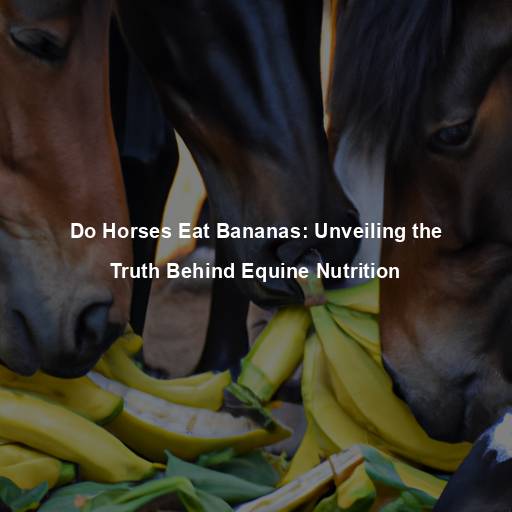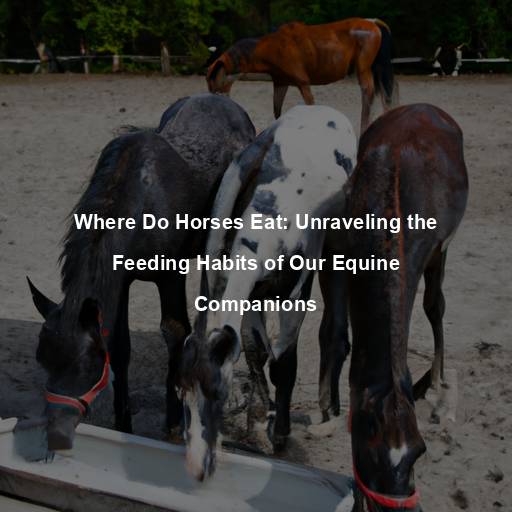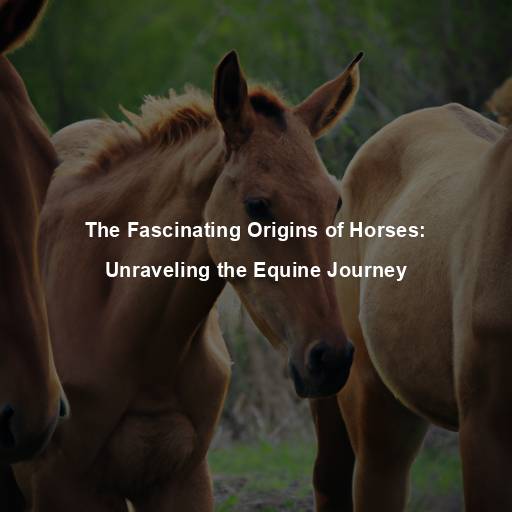Do Horses Eat Bananas: Unveiling the Truth Behind Equine Nutrition
Last Updated on August 6, 2023 by Evan
Contents [hide]
- 1 The Fascinating World of Equine Diets
- 2 Understanding Equine Nutritional Needs
- 3 Exploring the Banana’s Nutritional Profile
- 4 Factors to Consider
- 5 Treat Alternatives for Horses
- 6 The Importance of a Balanced Diet
- 7 Debunking Common Myths
- 8 FAQs: Do Horses Eat Bananas?
- 8.1 Can horses eat bananas?
- 8.2 Are bananas good for horses?
- 8.3 How should bananas be prepared for horses?
- 8.4 How much banana can I feed my horse?
- 8.5 Are there any risks involved in feeding horses bananas?
- 8.6 Can I feed bananas to my horse daily?
- 8.7 Are there any alternative fruits to bananas that I can offer my horse?
- 8.8 What should I do if my horse accidentally eats banana peels or stems?
The Fascinating World of Equine Diets
For centuries, horses have held a special place in our hearts with their majestic presence and calming nature. As caretakers, it is our duty to ensure their well-being, which includes providing them with a balanced diet. While hay, grass, and grains form the foundation of equine nutrition, a perplexing question arises: Can horses indulge in the delightfully yellow fruit called bananas? In this article, we will journey into the depths of equine dietary needs, carefully exploring their nutritional requirements and uncovering whether these elegant creatures can indeed savor the sweet taste of bananas.
Understanding Equine Nutritional Needs
The Herbivorous Lifestyle
When it comes to horses, their eating habits are quite intriguing. These majestic creatures are true herbivores, meaning their digestive systems have evolved in a peculiar way to effectively handle plant-based foods. What sets their gastrointestinal tract apart is the remarkable hindgut, which acts as a fermentation chamber, aiding in the extraction of valuable nutrients from fibrous vegetation. As a result, these magnificent beings can flourish by feasting primarily on roughage like grass and hay.
The Role of Fiber
When it comes to a horse’s diet, fiber is the unsung hero that keeps things running smoothly. It’s like the mysterious puzzle piece that helps maintain a healthy digestive system, fends off the dreaded colic, and ensures the gut is functioning like a finely-tuned machine. And where does this magical fiber come from? Look no further than forage, the superhero duo consisting of pasture grass and trusty hay, providing the perfect balance of bulk and stimulation to keep your equine companion in tip-top shape.
Essential Nutrients for Equine Health
Horses, majestic creatures of grace and strength, have culinary needs that go beyond the simplicity of fiber. To truly thrive, these elegant equines require a dynamic assortment of vital nutrients, carefully balancing their diets to encompass proteins, carbohydrates, fats, vitamins, and minerals. Proteins, like an orchestra conductor of growth and restoration, orchestrate the symphony of muscle development and tissue repair. Carbohydrates, much like a vibrant sunset painting the sky, serve as an awe-inspiring energy source that ignites their very essence.
Exploring the Banana’s Nutritional Profile
The Nutrient Composition of Bananas
Before determining whether bananas are suitable for horses, let us examine their nutritional composition. Bananas are renowned for being a rich source of potassium, an essential mineral that aids in muscle function, nerve transmission, and electrolyte balance. They also contain vitamin C, vitamin B6, dietary fiber, and small amounts of other minerals such as magnesium and manganese.
Potential Benefits of Bananas for Horses
Did you know that bananas can actually serve as a surprising treat for horses? Although not a common staple in their diets, these yellow powerhouses pack a punch when it comes to potential benefits. Packed with potassium, they can help horses maintain optimal muscle function and electrolyte balance, especially during those sweat-inducing workouts or scorching weather. And that’s not all – the dietary fiber found in bananas can also work wonders for promoting healthy digestion in our majestic equine friends.
Moderation is Key
When it comes to including bananas in a horse’s menu, a balanced approach is paramount. While these tropical treats are undeniably appealing to our equine friends, it’s important to be mindful of the potential repercussions. Given their relatively high sugar content, it’s crucial to avoid going bananas and overfeeding, as this could lead to undesirable consequences, such as weight gain and an elevated risk of metabolic disorders like equine metabolic syndrome or laminitis. To ensure our horses stay healthy and happy, let’s serve bananas in moderation and as part of a well-rounded diet.
Factors to Consider
Individual Variations
Just like humans, horses have their quirky tastes and preferences when it comes to food. While one horse might go bananas over the sweet taste of this tropical fruit, another might turn up their nose at the mere thought. It’s important to treat each horse as the unique individual they are, and consider their personal preferences when it comes to offering them treats. After all, why force a slice of banana on a horse who would rather munch on something else?
Allergies and Sensitivities
Just like humans, horses can develop allergies or sensitivities to certain foods. While bananas are generally safe for equine consumption, it is advisable to observe any potential adverse reactions after introducing them into a horse’s diet. If any signs of allergies or digestive upset occur, it is best to consult a veterinarian and discontinue the use of bananas as a treat.
Treat Alternatives for Horses
While bananas can be a delightful occasional treat for horses, there are several other options to consider. Here are some alternative treats that horses often enjoy:
Carrots, with their crisp texture and naturally sweet flavor, have become quite the favorite amongst our equine friends. Horses simply can’t resist indulging in these vibrant orange delights. The perplexity lies in why these four-legged creatures are so irresistibly drawn to the burst of flavor that carrots offer. Whether it’s the satisfying crunch or the alluring sweetness, carrots never fail to captivate the equine palate.
Apples have long been a tantalizing delight for horses, who find both the crisp texture and succulent juiciness utterly irresistible. Their love for this fruity indulgence is undoubtedly evident, as these majestic creatures savor every mouthful with sheer delight. It’s no surprise that apples have become a treasured treat among the equine community, forever entwined with their gastronomic desires.
– Peppermints or horse treats: Specifically designed for equine consumption, these commercially available treats provide a safe and enjoyable option.
Experimenting with Treats
Discover a realm of endless possibilities in the captivating world of equine treats. Venture beyond the boundaries of traditional options and unlock a captivating array of flavors and textures that will leave your horse’s taste buds tantalized and perplexed. Delight in the unexpected tanginess of succulent oranges or embrace the earthy crunch of celery, as your equine companion embarks on a culinary adventure like no other. From the delectable sweetness of juicy watermelon to the invigorating essence of mint, let your horse indulge in gourmet delights that complement a nutritious, well-rounded diet.
The Importance of a Balanced Diet
Consulting with Equine Nutritionists
Ensuring that our equine companions receive a well-rounded diet is paramount to their vitality and overall state of being. In order to address any uncertainties or queries pertaining to their dietary requirements, seeking counsel from either an equine nutritionist or a veterinary professional with a specialization in equine nutrition is highly recommended. These experts possess the expertise and knowledge needed to offer tailored advice tailored according to our horses’ unique requisites, which include considerations such as age, weight, activity levels, and any preexisting health ailments.
The Role of Forage
Forage should form the foundation of a horse’s diet. High-quality grass and hay provide essential fiber, which promotes healthy digestion and prevents digestive issues like colic. Ensuring a constant supply of fresh, clean forage is essential for a horse’s well-being. Alongside forage, concentrated feeds and supplements can be added as necessary to meet the horse’s nutritional requirements.
Balancing Nutritional Needs
Ensuring that horses receive a well-rounded diet is essential to their overall well-being. Various vital nutrients, such as proteins, carbohydrates, fats, vitamins, and minerals, work together harmoniously to support their health. While it may be tempting to offer horses treats like bananas, it is important to remember that these should be seen as a complementary addition, rather than a substitute for a balanced diet brimming with all the necessary nutrients.
Debunking Common Myths
Myth: Horses Can Eat Anything
Horses, with their awe-inspiring digestive prowess, have long been admired for their ability to consume a variety of sustenance. Yet, one must tread cautiously on the path of assumption, for these majestic beings are not invulnerable to the consequences of ill-suited meals. With their distinct dietary needs and an intricate digestive labyrinth, horses demand a careful balance of nourishment. One must be aware that feeding them unsuitable or harmful fare can trigger a perilous ballet of digestive disorders, precarious nutritional imbalances, and even unfathomable ailments like the dreaded colic.
Myth: Fruits Are Always Safe for Horses
When it comes to treating our noble equine friends to a fruity indulgence, caution must be exercised. As tempting as it may be, not all fruits are bestowed with the stamp of approval for our four-legged companions. The secret lies in a little detective work: peel back the layers of knowledge to decipher which fruits are tantalizingly safe and which, like the forbidden avocado and tantalizing cherry, should be kept far away from the prancing hooves. So, dear horse enthusiasts, before extending an outstretched hand holding a tempting fruity morsel, embark on a quest of research and vigilance to ensure the harmonious blending of taste, health, and equine-friendly treats.
Myth: Horses Need a Constant Supply of Treats
When it comes to bonding with your beloved horse and aiding their training, treats can be an appealing choice. However, it is essential to exercise caution and moderation when it comes to these delectable rewards. Going overboard with treats can unexpectedly pave the path to weight gain, obesity, and a host of related health concerns. Hence, it is advisable to perceive treats as occasional indulgences rather than an integral element of your cherished horse’s daily dietary routine.
FAQs: Do Horses Eat Bananas?
Can horses eat bananas?
Believe it or not, our four-legged friends can actually munch on bananas! Surprising as it may sound, these fruity treats are entirely safe for horses. However, it’s crucial to remember that moderation is key, and opt for fully ripened bananas when feeding them to your equine companions. So go ahead, add a touch of fruity delight to their diet, keeping those horse smiles wide and appetites satisfied!
Are bananas good for horses?
Bananas can provide some nutritional benefits to horses. They contain carbohydrates, which can serve as a source of energy. Additionally, bananas are rich in potassium, vitamins, and minerals that can contribute to a horse’s overall health.
How should bananas be prepared for horses?
Before giving a banana to a horse, it is recommended to peel it and cut it into small, bite-sized pieces. This makes it easier for the horse to chew and swallow. Some horses may prefer mashed or blended bananas if they have dental issues or struggle with chewing.
How much banana can I feed my horse?
When it comes to treating our equine friends with the delight of a banana, it’s all about finding that delicate balance. While they certainly enjoy the occasional indulgence, it’s crucial to be mindful of serving sizes. Offering a few dainty slices or chunks a day keeps their digestive health happy, ensuring a harmonious dietary equilibrium. Bear in mind that a banana bonanza may result in tummy troubles or upset the equine nutritional harmony. So, let’s savor the sweetness in moderation and keep our horse’s well-being at the forefront.
Are there any risks involved in feeding horses bananas?
When it comes to horses and bananas, there’s a curious twist to the equation. While bananas are usually a safe bet, every horse has its own set of quirks and surprises. Some might have a sensitive soul that gets ruffled by the fruity delight, so it’s wise to approach the introduction with a measured dose of caution. After all, nobody wants a horse with a tummy ache and a case of the runs. When in doubt, gallop straight to your trusty veterinarian for some expert guidance on how to keep your equine companion happy and healthy.
Can I feed bananas to my horse daily?
When it comes to nourishing our equine friends, it’s essential to tread cautiously in the realm of fruits, specifically bananas. While these yellow delights are undoubtedly tantalizing, it’s crucial to understand that horses have their own set of nutritional needs. The fundamentals of their sustenance lie in hay, grass, and properly formulated concentrates, rendering bananas more of an occasional indulgence rather than a steadfast daily supplement. Let’s navigate the equine menu thoughtfully, embracing balance and catering to their distinct dietary regimen.
Are there any alternative fruits to bananas that I can offer my horse?
As equestrian enthusiasts, we often seek out new and exciting ways to treat our beloved horses. And when it comes to treats, why limit ourselves to the usual suspects? There’s a world of fruit waiting to delight our equine companions. Imagine the burst of flavor as they indulge in juicy apples, crisp pears, or the refreshing sweetness of watermelon, careful to avoid the seeds, of course. And let’s not forget the classic carrot, a staple in any horse’s snack repertoire. Remember, as with any new addition to their diet, introducing these fruity delights gradually and in moderation is the key to ensuring our equine friends can fully savor the experience.
What should I do if my horse accidentally eats banana peels or stems?
As equestrian enthusiasts, we all know that horses have an appetite for the unexpected. And yes, that might include the peculiar act of munching on banana peels or stems. While it may not necessarily ring alarm bells, it’s always wise to err on the side of caution when it comes to our equine companions. Simply ensure that no traces of this fruity snack are within their grasp and should any peculiar behavior arise, it’s wise to seek the sage advice of a veterinarian for a hoof in the right direction.







